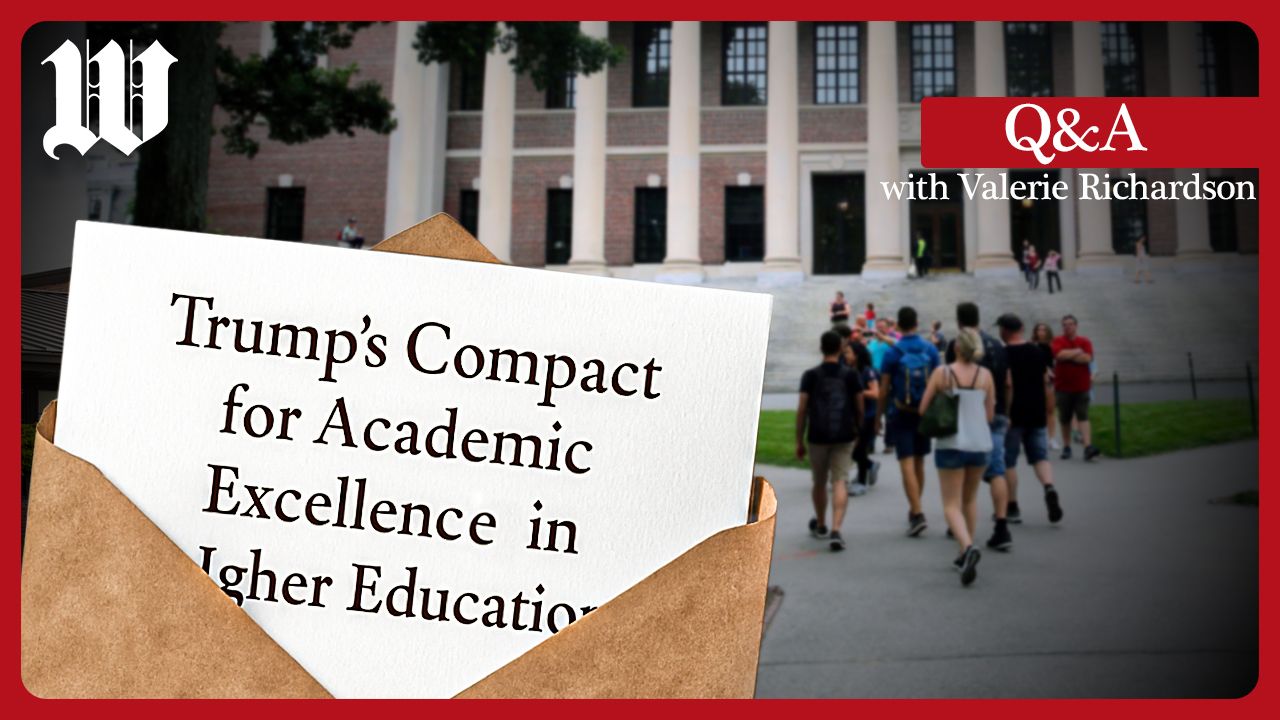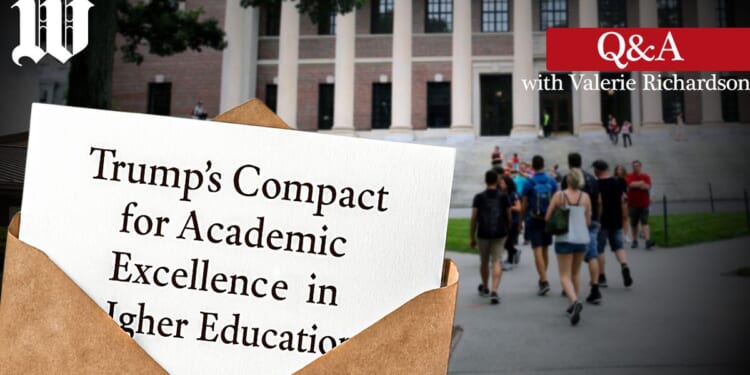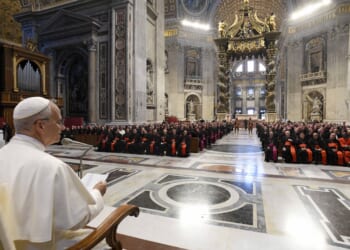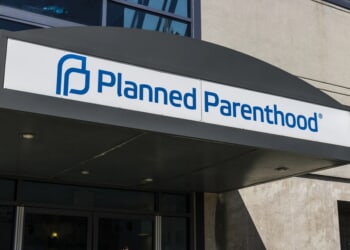
Nine major universities were invited to join the Trump administration’s new Compact for Academic Excellence, but none have signed on. The proposal ties federal funding to new rules on tuition, DEI programs and admission standards. This has some institutions standing an objection of the deal with concerns that it encroaches on their academic freedoms.
My name is Valerie Richardson, reporter for the Washington Times,
I’m here to answer your questions on the compact and how it fits into the Trump administration’s vision for higher education.
What exactly is the Trump administration’s compact for academic excellence?
The Trump administration’s compact is a 10-page document that it released October first, it invited nine universities — all of them elite universities — to sign on to the Trump administration’s vision on items such as increasing viewpoint diversity, merit-based admissions and hiring, institutional neutrality, biological definitions of sex, freezing tuition for five years, and placing a 15% cap on foreign enrollment for undergraduates students.
The nine universities that were invited to join the compact are Harvard, Dartmouth, Brown, University of Pennsylvania, University of Arizona, USC, Vanderbilt, MIT, and the University of Texas at Austin.
Have we ever seen anything like this before?
Generally, the relationship between higher education and the White House in the past has been the federal government funds programs through grants and research, and higher education carries these things out at the university level. But there hasn’t really been a lot of input into other aspects of what goes on at the university, such as taking into account factors like race and sex into admissions and hiring. We’ve seen court decisions on that, but the federal government really hasn’t weighed in on that. This is the Trump administration really taking a big move into higher education and saying, hey, if you want the federal dollars, we’re going to need you to comply with some of our priorities.
What are the current administration’s concerns with foreign influence?
The administration has a lot of concerns. It’s concerned that foreign gifts from in particular places like China and the Middle East to universities are causing universities to change their curriculum, change their viewpoints, and in particular with regard to antisemitism. They’re also concerned about a curriculum that skews to benefit foreign countries because, you know, if you give grants to a university, you want something in return, and they’re concerned about what these countries may want in return.
What freedoms do some universities believe are at risk?
The biggest concern is academic freedom. Their concern is that the Trump administration or the White House or the federal government is going to require them to give up their independence and teach essentially what the Trump administration wants to see taught. That’s an enormous debate in academia. We have two sides of the argument here, one saying that, in the absence of any federal influence, we’ve seen universities skew to the left and an extremely small number of conservative faculty anymore at universities because most universities now are sort of headed by people who are more on the liberal side of the spectrum.
How are staff and student bodies responding?
Well, they’re very much against it. I don’t think I’ve seen any faculty groups or student groups that have supported this. You’ve seen student protests on some campuses. You’ve seen faculty votes. Responses that we’ve gotten from the eight universities that have responded. They all insist, no, we’ve implemented institutional neutrality, we’re really working on viewpoint diversity. We have that too. We need our academic freedom, but we are trying to adopt these, or we have adopted these policies as well. And, you know, I would say these are recent adoptions, and whether or not these universities actually follow through on viewpoint diversity, remains to be seen, the Trump administration is clearly giving them a push.
Will we see nationwide policy change similar to this?
After the Trump administration invited the nine universities to join the compact on October 1st, about two weeks later, President Trump went on Truth Social and extended a national invitation to all universities to join. He essentially said this is open to everybody. But what we haven’t seen so far is a formal invitation from the White House. The universities have provided their feedback to the White House, eight of the nine. And this has been characterized as a draft proposal. And so what we may see is that the White House may take into account some of their feedback. They may redo or edit parts of this and come back with an updated proposal that perhaps addresses some of the university concerns and then offer that up nationally to universities and see if other universities decide they want to go ahead and sign on to this.
Read more from Valerie Richardson
Read more on the Compact for Academic Excellence:
- Forget Harvard: New College of Florida wants to be first to join Compact on Academic Excellence
- Trump anti-DEI education compact still waiting for a ‘yes’ as Arizona declines, Vanderbilt dodges
- No takers yet as Dartmouth, UVa. spurn Trump administration’s anti-DEI education compact
- USC declines to sign Trump administration’s anti-DEI education compact











![Florida Officer Shot Twice in the Face During Service Call; Suspect Killed [WATCH]](https://www.right2024.com/wp-content/uploads/2025/12/Inmate-Escapes-Atlanta-Hospital-After-Suicide-Attempt-Steals-SUV-Handgun-350x250.jpg)





